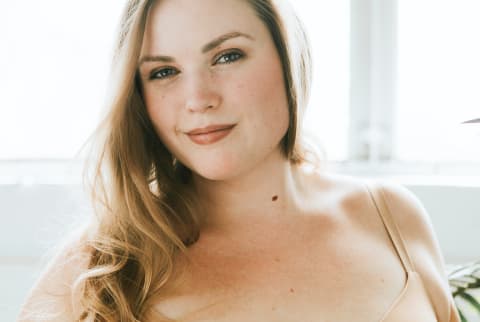Advertisement

I had my first inkling that I could heart my body about five years ago. I'd never really considered it before. Well, I take that back. I'd actually done more than considered it; I'd obsessed about that shiny day in the future when I’d finally be thin and fit, radiant and happy, loving my body to the max. That future always felt simultaneously right around the corner and light-years away. I really wanted to believe it would happen -- really, really wanted to believe it. But loving this body as it is, right now? No, thanks.
People don’t love bodies like this one, right?
That was my truth for most of my life. But gradually, probably around my 65th diet (not making that up!) to no avail, a thought so random and unbelievable bubbled up that I pretty much instantly dismissed it: maybe hating my body into submission isn’t the way to go. Maybe, in fact, it’s completely counter-intuitive.
What I’ve found to be the most difficult part of learning to heart my body, and what I’ve heard from many other people, is that it’s hard to shake the black-and-white thinking. In my case, my black-and-white thinking was myriad: I can either love my body and totally stop caring for it or hate it and be thin; I can’t be happy until I’m thin; everyone has a messed up relationship with food; and on and on. Years of dieting had trained me (very well!) to always be putting my hope in the future instead of the present and to place my fate in the hands of something external (like the newest diet book) instead of, well, my own hands.
This black-and-white thinking would now have me rattle off a how-to list for you to start loving your body -- in the next five minutes. Since I know how counterproductive that is, though, I will share what has helped me. These are options for you to consider, regardless of how/why you are wishing to heal or change your relationship with your body.
- Quiet: It can be challenging for many of us to find a few minutes of quiet. Whether we’re constantly running around meeting others’ needs or obsessively checking Facebook for the 43rd time in the last two hours, we’re more likely to fill time than hold it. What I’ve found is that I’m an expert at checking out of life and calling it productivity. The more time I can create for quiet, and single-tasking, the more I can start to check in to my own life.
- Intuitive eating: When I first learned about honoring your body through intuitive eating -- eating when you’re hungry, stopping when you’re full -- I was delighted. I thought it was the perfect new diet and immediately fit it into my dieting paradigm of binging when I wanted and only eating certain foods I deemed okay the rest of the time. This was intuitive to me at the time, so I was glad to pat myself on the back for shifting into this “new” way of eating (which was exactly the same as my old way). Over time and with considerable practice, though, I realized I wasn’t listening to my body; I was listening to my mind’s ideas about what I “should” be doing. My mind can be pretty dang persuasive; it has a million and one reasons why, sure, I can do intuitive eating -- just not until I lose enough weight through dieting. My body either speaks quietly or shouts (usually through illness), so the more I listen to the subtle voice, the more I realize my body can be trusted -- and that my mind has some pretty wild ideas that should be examined and questioned.
- Support: I grew up thinking that therapy wasn’t for me -- that it was only for people who can’t “handle” their problems, and I obviously wasn’t one of them. After dipping my toe in the water of support, though, I realized how dramatically wrong I was. We can all benefit from support; we just have to figure out what that looks like for us. It could be a nutritionist, a journal where you can spill out all your thoughts, a therapist, a life coach, a trusted best friend, a long walk on the beach or (in my case) some combination of all of these.
- Grounding: My instinct is to live my life in my mind -- worrying, planning, obsessing, catastrophizing. Left to my own devices, I will spend all day reading, whiling time away on the computer and amping up the drama in conversations with friends until I reach a fever-pitch. It is for these reasons that I return to the discipline of meditation and yoga every day. This doesn’t mean I do it every day, but rather that I hold it as an intention. Because I know that the more lovely, hand-calligraphed invitations I give myself to be here in the moment, the more likely I am to RSVP.
- Giving Yourself a Break: This may be the hardest part. My black-and-white thinking causes me to think that if I can only perfect all of these suggestions, I will finally be the person I want to be. But transferring my dreams of the perfect thin body to the perfect mindful life is not any better; it’s still all a projection into the future and a rejection of the present. As many days as not, I don’t do all of this -- or any of it. The difference now is that I use some of these options to recognize that and pick up where I left off. All is not lost, as I used to believe.
Instead, it’s just another opportunity to add to the heart.
